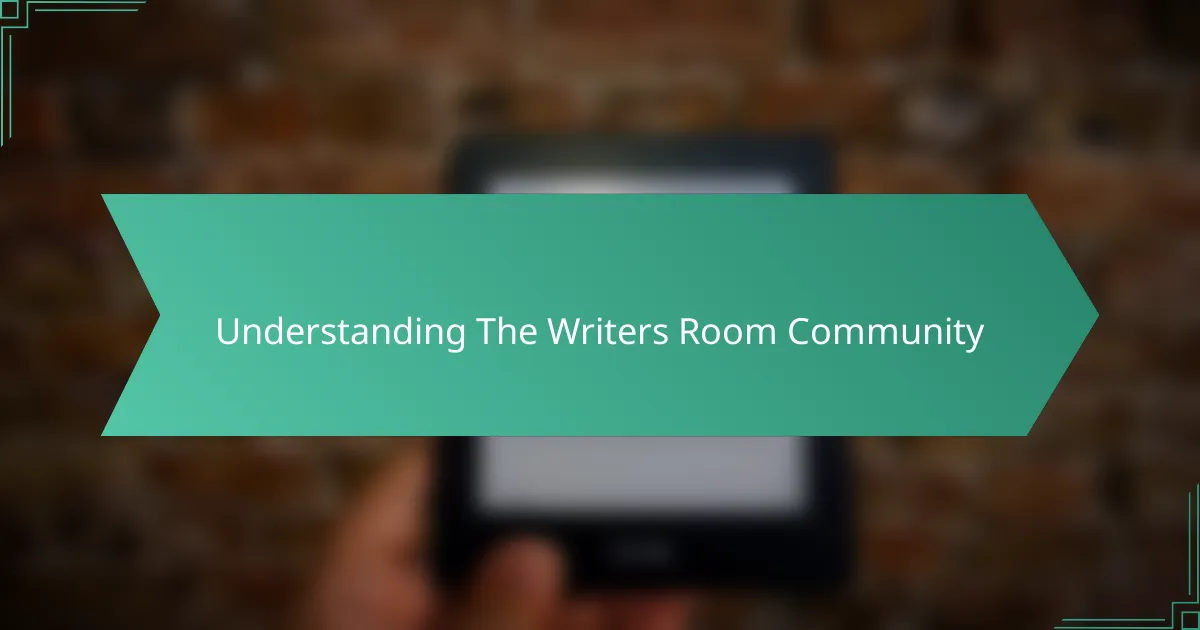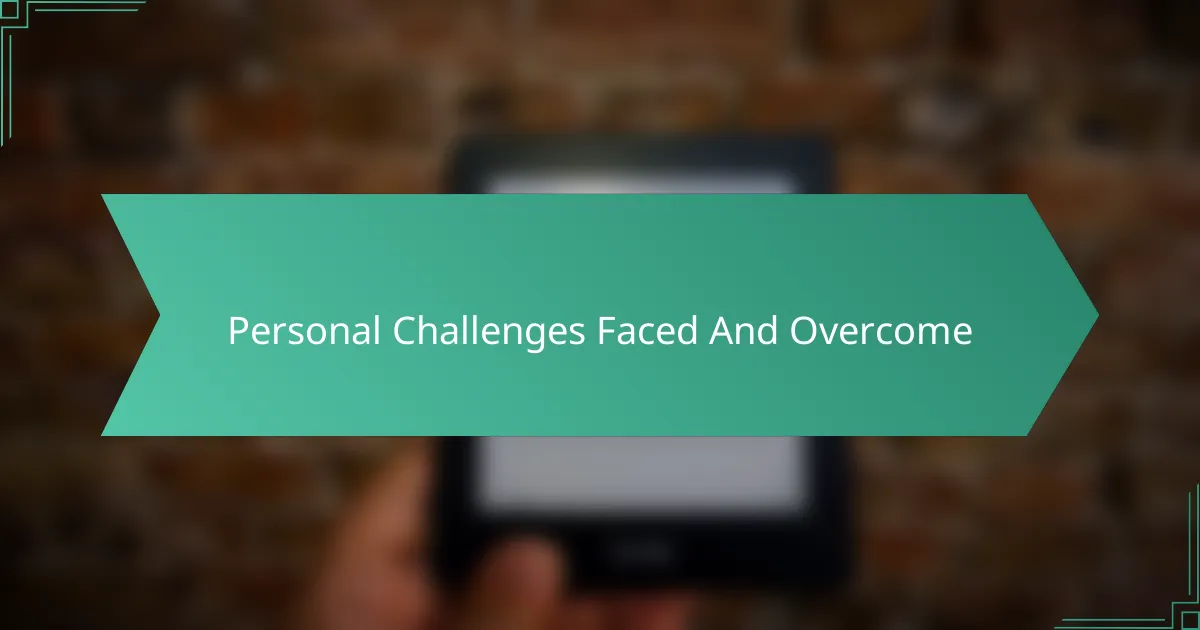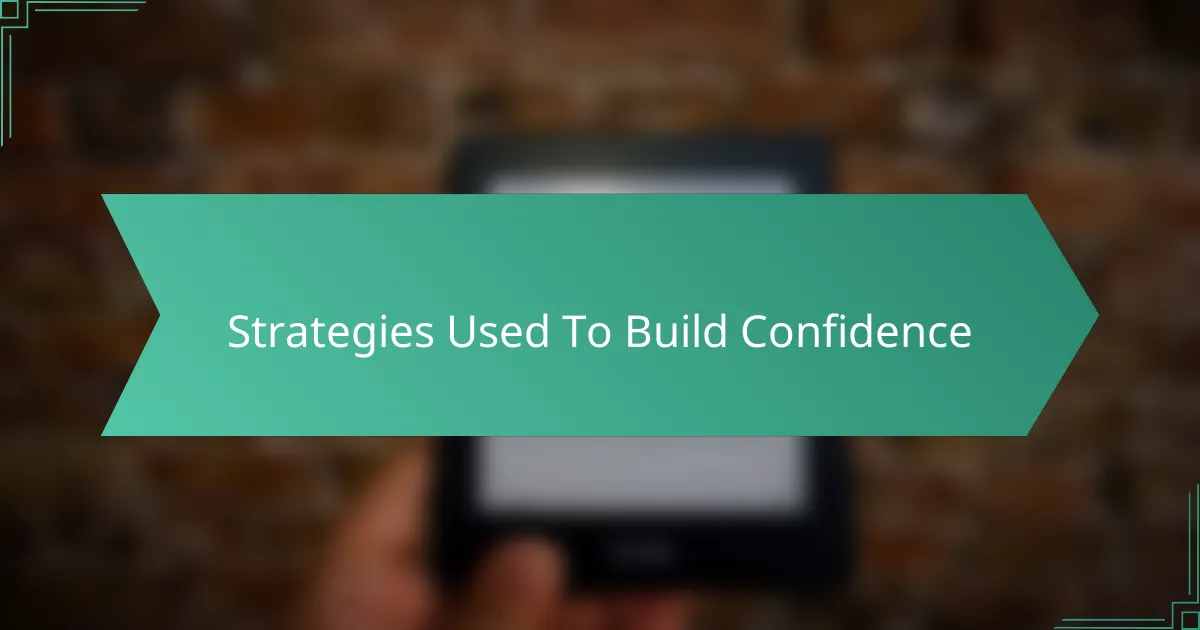Key takeaways
- The Writers Room community in Portland fosters a supportive environment, helping writers of all levels find confidence and belonging.
- Access to diverse perspectives through workshops and feedback enhances personal growth and the quality of writing.
- Practical workshops on pitching and publishing demystify the submission process and empower writers to pursue their goals.
- Embracing vulnerability and celebrating small achievements are key strategies for building confidence and overcoming self-doubt.

Understanding The Writers Room Community
The Writers Room community in Portland feels like a second home to me. It’s a place where diverse voices intersect, each story adding a new layer of depth to our collective experience. Have you ever been somewhere that instantly feels welcoming? That’s exactly what this community offers—a genuine sense of belonging.
What struck me most was how everyone’s journey is respected, no matter the stage of their writing career. When I first joined, I worried my ideas wouldn’t be good enough, but the encouragement from fellow writers quickly dissolved those fears. It’s not just about critique here; it’s about uplifting one another.
I often wonder why some writers hesitate to join groups like this. Maybe it’s the fear of judgment or the vulnerability that writing demands. But in The Writers Room, vulnerability becomes a strength, and that shift changed the way I saw myself as a writer and, ultimately, gave me confidence I hadn’t felt before.

Exploring Resources For Writers In Portland
Portland offers an impressive range of resources that made me feel supported from the moment I started exploring. Local libraries and community centers often host writing workshops that aren’t just about technique—they focus on connection, which I found invaluable. Have you noticed how learning alongside others who share your passion can boost your confidence?
What really stood out to me were the open mic nights and writer meet-ups scattered throughout the city. These events gave me a chance to hear different voices and receive feedback in real-time, which was both nerve-wracking and rewarding. I remember once nervously reading a short piece aloud, only to be met with genuine applause—those moments sparked a new level of self-belief.
Another resource I leaned on was Portland’s array of online forums and writing groups, including those tied to The Writers Room. Connecting virtually allowed me to keep that momentum going outside of physical meet-ups. Isn’t it amazing how having a go-to network can remind you that you’re never writing alone?

Benefits Of Joining The Writers Room
One of the biggest benefits I found in joining The Writers Room was the steady boost in my confidence. Being surrounded by writers who genuinely cared about each other’s progress made me realize that my voice mattered. Have you ever noticed how simply having a supportive audience can change the way you approach your work? That sense of encouragement kept me coming back, eager to share more.
Another advantage I discovered was access to diverse perspectives that challenged and enriched my writing. Listening to feedback from people who saw my story through different lenses pushed me to grow in ways I hadn’t expected. It reminded me that writing isn’t just a solitary act—it’s a dialogue, and that interaction can make your work stronger and more authentic.
Finally, The Writers Room provided a consistent routine that helped me develop discipline. Meeting regularly with a group that values creativity created momentum I struggled to find on my own. I often asked myself, “How can I stay motivated when writing feels isolating?” The answer came from showing up, feeling accountable, and sharing that journey with others who understood exactly what I was experiencing.

Key Activities And Workshops Offered
The workshops at The Writers Room felt like a lifeline when I first stepped in unsure of my own voice. From weekly craft sessions on character development to sessions focused on narrative voice, each workshop was crafted to help writers like me dive deeper into the art of storytelling. Have you ever found that a single new technique can unlock a story you didn’t even realize you were capable of writing?
One activity that made a huge difference for me was the peer critique circles. Sitting in a room where everyone’s writing was respected—and where feedback was both honest and kind—changed my whole approach to revision. It was here that I learned the value of constructive criticism and how it could be a tool for growth rather than a source of doubt.
Beyond writing itself, The Writers Room offers workshops on pitching and publishing, which felt like discovering a whole new world. Suddenly, the intimidating process of submitting work didn’t seem so distant or daunting. It made me ask, why hadn’t I thought about these next steps before? Taking advantage of these practical workshops made my writing journey feel more complete and gave me real confidence to pursue publication.

Personal Challenges Faced And Overcome
Facing my own self-doubt was the biggest hurdle when I first joined The Writers Room. I often questioned whether my stories were worth sharing, and that fear sometimes kept me silent during group sessions. Have you ever felt that knot in your stomach before speaking up? Over time, hearing others grapple with similar fears helped me realize I wasn’t alone—and that made all the difference.
Another challenge I encountered was the struggle to accept feedback without taking it personally. Early on, I’d shut down when critiques hit close to home, feeling like I was being judged rather than helped. It took a few sessions—and some honest conversations—to understand that critique is a gift, aimed at making my writing stronger. Once I made that shift, my growth accelerated in ways I hadn’t imagined.
There were moments when balancing writing with everyday life tested my commitment. Juggling work, family, and creativity felt overwhelming, and I sometimes wondered if I had the stamina to keep going. But The Writers Room became a kind of anchor, reminding me that persistence pays off. Isn’t it encouraging to find a space that gently pushes you forward when your own motivation falters?

Strategies Used To Build Confidence
One of the strategies that really helped me was setting small, achievable writing goals during group sessions. Instead of aiming for perfection, I focused on completing just one paragraph or sharing one idea. Have you ever noticed how crossing off a tiny task can light a spark of confidence? For me, those small wins accumulated, turning doubt into a quiet determination.
Another approach that made a big difference was actively seeking feedback—and not just from the most experienced writers, but from peers at every level. Initially, I was hesitant, fearing my work wasn’t ready. But I learned that sharing early and often invites growth. How often do we underestimate the power of a fresh pair of eyes? The constructive comments I received helped me see my writing through new perspectives, boosting my belief in my own voice.
Lastly, I made a habit of celebrating progress, no matter how modest. After each workshop or critique circle, I took a moment to acknowledge what I’d learned or the courage it took to participate. It might sound simple, but these recognitions became a cornerstone of my growing confidence. Isn’t it amazing how a little self-encouragement can transform uncertainty into excitement about what comes next?

Tips For New Members To Thrive
One tip I found essential was to dive in fully, even if it feels intimidating at first. I remember hesitating before my first critique circle, worried my writing wasn’t ready for eyes other than my own. But showing up anyway taught me that being present mattered more than perfection—and that simply participating helped me grow quicker than I expected.
Another practice that helped me thrive was building genuine connections with other members. It’s easy to see these meet-ups as just writing sessions, but I discovered the power of friendship and support between the lines. Have you ever noticed how sharing stories in a trusting atmosphere makes feedback feel less daunting and more like encouragement? Those relationships became a lifeline during moments of doubt.
Lastly, I learned to embrace every opportunity for feedback—not as a judgment, but as a gift for improvement. Early on, I’d sometimes shy away from critique, fearing it meant I wasn’t good enough. But leaning into honest, kind feedback transformed my perspective and, ultimately, my confidence. What if every comment is really a stepping stone to your best work? That mindset changed everything for me.